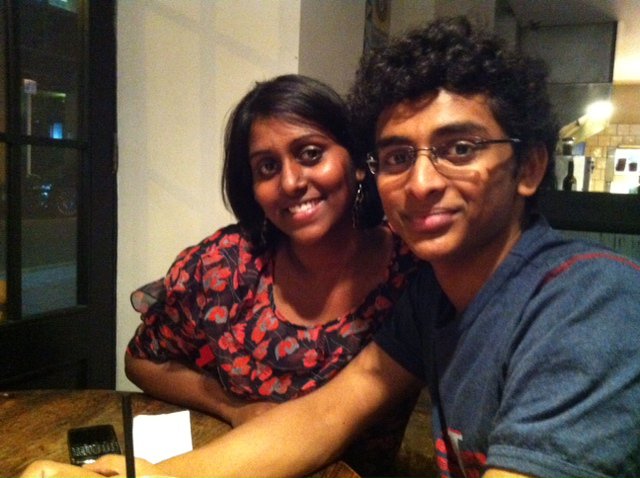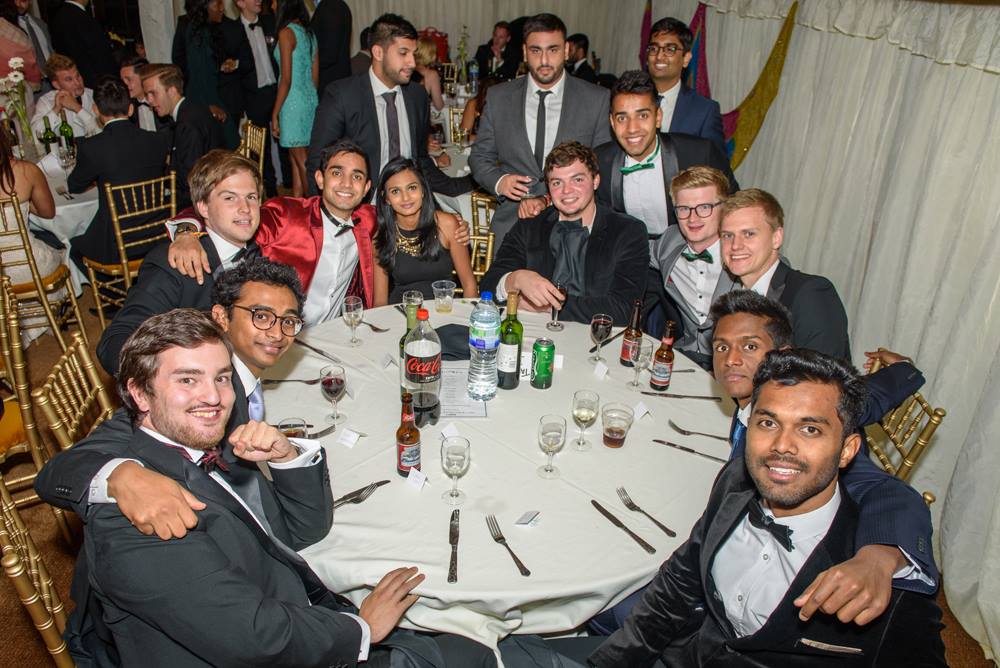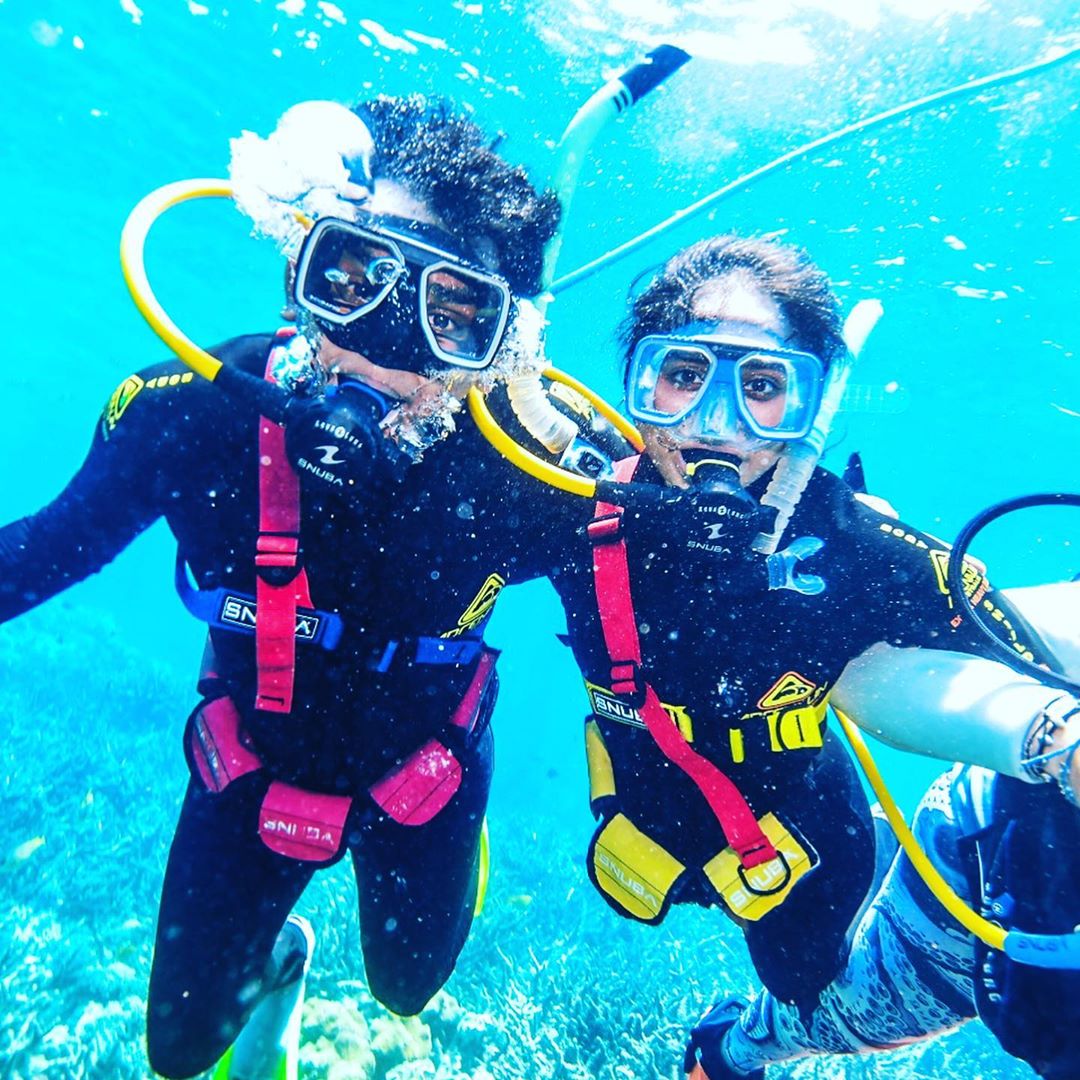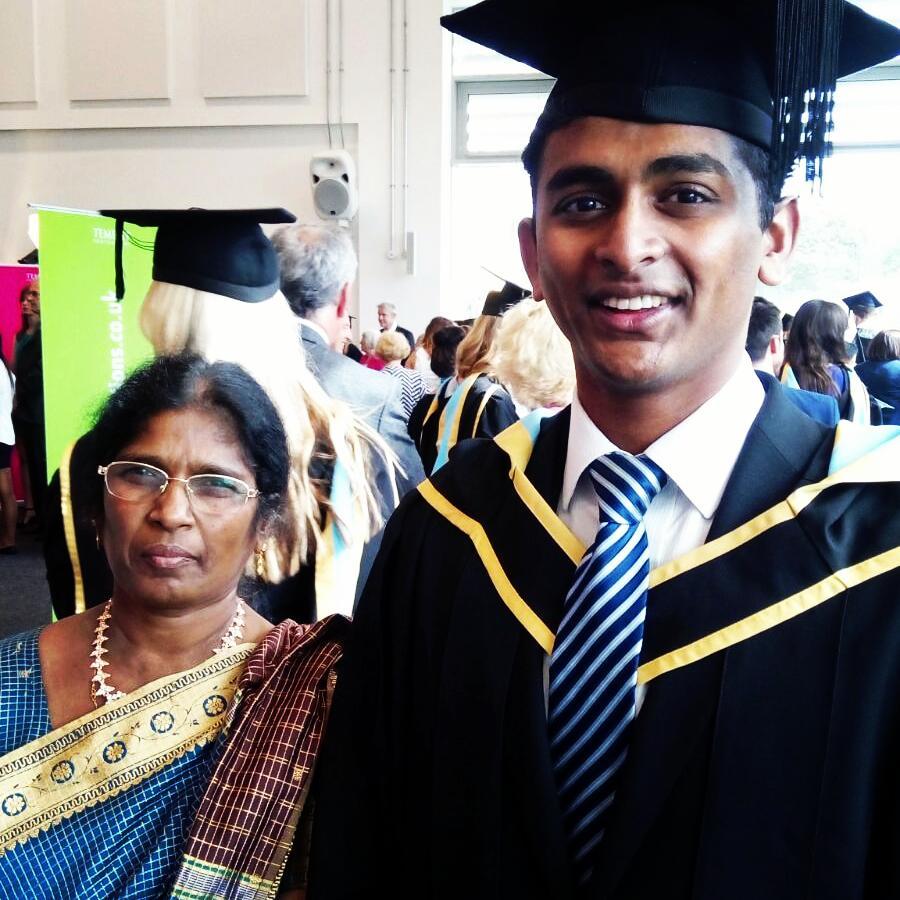June 15, 2020, by School of Medicine
Medicine, Nottingham and the Adventures beyond
One of our 2017 graduates got in touch to share his experiences studying medicine at Nottingham and what he got up to after graduating. This is Dr Arjunaa Wimalathasan’s story.
Born and raised in the South of London, the son of refugees and the brother of an over achieving sister, a lot of my childhood years was filled with confusion based primarily in an identity crisis of who I exactly was and where I fit exactly in the world. Was I English? Was I Sri Lankan? Was I Tamil? Why didn’t I look like my peers and where do I fit in the world exactly? A visit to Sri Lanka quickly hits home that I don’t completely belong there either. A misfit who didn’t quite fit any box was my general vibe and I went through secondary school not really knowing what I wanted to do in life.
I knew I needed more than just money and it was probably going to be science or maths based because this was what I was good at but I didn’t really have any impetus to really chase anything specific. I wasn’t particularly strong at sports and for the most part I didn’t really excel in anything to guide me towards a future career pathway.
My ancestors hail from the Kingdom of Jaffna, which is in modern day northern Sri Lanka. Since independence in 1948 there have been racial tensions between various ethnic groups in the country which has led to civil strife and mistrust. This kindling ignited into civil war in the 1980s and laid the foreground to my story.
My parents, University graduates – planning a career in Soil Agriculture were forced to escape conflict as refugees and flee to the UK. Here, their degrees now useless, they started from rock bottom working menial jobs in bitter winters for the promise of a better tomorrow.
Growing up, we always knew we were the lucky ones and the immense sacrifices that our parents made was our privilege and our responsibility. The contemporaneous war stories we heard of enormous tragedy and despair during our childhood gave us a harsh reality check into our positions; propelling us to achieving more and doing more with our lives. Financial security was an aim but more importantly was to be in a position where you could help those in need and make positive change to those beyond ourselves.
At home also, our parents (for better or worse) imprinted a survivor mentality into us. We needed to endure and that meant finding a career which had job security, one that you could always rely on and one which you weren’t easily replaced. I had ruled out desk jobs early on in and I knew I didn’t want to ‘live for the weekend’ and wanted a job where every day was different.
Ultimately it was this nebulous of ideas that distilled into Medicine. It offered everything I needed and whilst it wasn’t as financially rewarding as Economics (which my sister went into) it offered the prospect of developing communication skills that I had thought myself as weaker in. Thinking that I was academically strong, I got complacent in Year 12 and life threw a curve ball when I flopped my A-levels.
Psychologically this was tough but I had already committed to Medicine and I told myself that I was going to make it against all odds. I ended up retaking a year later, applying again and, with some inspiring faith from my form tutor, I got into schools in London and Nottingham.
This was one of the best moments of my life and I knew I had only just started a journey; whilst London offered me everything I could want, Nottingham was an escape to the country and a space for me to develop outside my sister’s shadow. It offered me a 6 year degree squished into 5 years and opportunities of a campus life – something my parents romanticised to me about their university days. The University has an excellent reputation with its fair share of Nobel prizes and the Medical school was one I had really fallen for on its open day. Nottingham I had concluded, was the place I needed to be and I, the captain of my own fate, sealed the deal.
Moving to Nottingham was an exciting time, I had decided I wanted to be on Jubilee Campus because I figured on average it was closer to the Medical School and I didn’t want to risk being on the far side of University Park. Accommodation felt like a hotel and campus was a joy to walk around sightseeing the ducks, lake and grass alongside the quirky shaped buildings. This was going to be an adventure I had decided and I’m glad I came here.
The Medical School basically takes a whole wing of the massive Queen’s Medical Centre and it’s fantastic. The QMC, as it’s often referred to, is one of Europe’s biggest hospitals and when we started, we were warmly welcomed to the school. The hustle and bustle of meeting so many new people who are all so warm and welcoming is truly unforgettable.
Everything is at your disposal from computers in the library, plenty of books and specialists in their field who take time to come and educate us. Each of us is allocated a tutor for the whole degree to ensure that we are well supported, and we have our Medic ‘Mums and Dads’ who are basically students in the year above who can guide us through any situation we find ourselves in. The course itself is heavily lecture based to start and it’s a different kettle of fish to what you are used to studying so far.
Still, I was enjoying the freedoms of university, the excitement of a new chapter and the prospects of one day becoming a Doctor.
 I was cruising along trying to find my way around Nottingham, campus and our medical subject matter until March 9th 2012. On this date, my sister spontaneously suffered a massive brain haemorrhage and suddenly everything changed.
I was cruising along trying to find my way around Nottingham, campus and our medical subject matter until March 9th 2012. On this date, my sister spontaneously suffered a massive brain haemorrhage and suddenly everything changed.
I, the escapee, had to suddenly come home and face the reality of what was happening. In three short days she tragically passed away and my world was never the same again. Mum and Dad who had been gunning for both of us now were left clinging to me for survival.
I found myself in a position of desperation. My parents now in turmoil and with a dead sister left me in psychological anarchy. I was mourning for my sister, being present for my parents and studying medicine all at the same. Difficult was the understatement of the year.
Fortunately, the University came into its own and did everything possible to support me during this exceptionally tough time. I had come home for funeral processions, and this meant that I had lost several weeks of lectures and tutorials – something I was aware that could affect my academic record. I didn’t want to fall back a year and lose all the friends I had just made, and mercifully the university was kind enough to let me continue my studies with no real hassle.
Lectures were all online and I could easily catch up whilst I was at home. Pastoral care and support were second to none with regular check-ups with my welfare by my tutor. More importantly the friends here were genuinely the kindest souls that one could hope for. The support I received is something I am truly grateful for and talking to friends who also had exceptional circumstances at other universities, it’s clear that Nottingham went above and beyond to ensure that I had the best possible chance of achieving my dreams.
Towards exam times, I was lucky enough that friends gave me their lecture notes to study from and I did well in my exams. I averaged a 2.1 in first year but honestly, I was just glad I hadn’t failed. The university didn’t have to take my exceptional circumstances into account because of this and I allowed myself to begin the process of grief.
‘Death brings with it a heartache no-one can heal; love leaves with memories that no-one can steal. An incessant raging inner battle between trying to remember and trying to forget where you are simultaneously the perpetrator, witness and victim. An utter humiliation of you being but only a small child juxtaposed with a sudden authorisation of fearlessness. A bitter reminder to appreciate the small wonder of it all I suppose.’
Even in this madness, the peace and tranquillity of Nottingham came into a space for where I could meditate and reflect on life. Home was a disaster and University Park campus was a place where I found myself on long walks pondering the Universe, my place in it and what my purpose was.
After a couple of years, I graduated with my BMedSci 2nd Upper Division and entered the clinical phase of the main degree. Here the game changes significantly where now no longer academic ability the bar by which you are measured but your clinical acumen. Here, soft skills like your ability to communicate, empathise and rationale with your patient are developed and the standard by which you are assessed.
For this though, you need to develop as a person and be able to talk to people, be able to prioritise and be able to work in a team. Nobody wants a Doctor who can’t talk to people or rationalise verbally why a decision has been made and the University isn’t going to graduate you if you don’t hone these skills alongside your academic requirements.
The long sequential nights of partying away in the clubs in Nottingham and replaced with early morning commutes and clinical placements to Derby, Mansfield, Lincoln or Grantham alongside the QMC and City Hospital. Rotations are necessary (and understandably justified) to ensure that you are exposed to a good range of placements and population demographics.
Here though, I began to struggle, the pain of grief I had thus far managed to avoid by drowning myself in my work. Suddenly in my Psychiatry rotations I found myself studying states of mind which I myself was possibly suffering with. This exposure forced me to face my issues at home, my grief and it cumulated with me failing a whole bunch of exams leading to an academic sabbatical.
An academic sabbatical, for those of you who don’t know, is a year out of your studies. It was a difficult phase whereby I was forced to take time out to repeat exams and I truly felt like a failure. I had failed to get into Medical School initially, I had failed these exams and I felt like I failed my sister who, despite her benevolence towards me, always surpassed my achievements. Survivor’s guilt ran through my veins and I wasn’t going anywhere until I addressed it.
 After this debacle, the Medical School recommended I attend some life coaching sessions to change my perspective on the way I see the world. My survivorship mentality had been put into overdrive and my single tracked mindedness had led me to neglect areas of my life which were leading to my overall failure. I was pouring from an empty cup, burning the candle from both ends you could say, and this was resulting in poor clinical acumen. A fresh point of view with new mindfulness techniques taught me to first pour energies into myself and feed my own soul before I could focus my energies elsewhere.
After this debacle, the Medical School recommended I attend some life coaching sessions to change my perspective on the way I see the world. My survivorship mentality had been put into overdrive and my single tracked mindedness had led me to neglect areas of my life which were leading to my overall failure. I was pouring from an empty cup, burning the candle from both ends you could say, and this was resulting in poor clinical acumen. A fresh point of view with new mindfulness techniques taught me to first pour energies into myself and feed my own soul before I could focus my energies elsewhere.
What was particularly good about this was that this entire experience was independent from the Medical School and run by a third party organisation and so my right to privacy was respected and more importantly, at least in my mind, my medical record was left unblemished. The architecture of this wall between coaching and my medical record is something I doubt few other medical schools actually offer and something I cannot praise Nottingham enough for. This over-and-aboveness for the welfare of their students, something which isn’t tangible in league tables is what truly sets Nottingham apart.
After coaching, it was clear that this was the change I needed. I went back to basics and regulated my sleep pattern, I started regularly exercising and eating healthy nutritious food alongside reading motivational and self-improvement books. I started meditating regularly and focused a lot of my energies on playing music and studying for my resits. It was a radically different approach and throughout it all the University didn’t micromanage nor let me completely fall through the cracks.
My resits came and thankfully I passed through to final year.
For final year I took my new approach to life and really dissected what was needed for me to pass. I regularly took time to socialise with friends and continued playing music and exercising along with all the other tools at my disposal to help regenerate my body and mind. I would work as intensively as before but for shorter periods with regular breaks and good nutrition. I had formulated a long-term plan and day by day, week by week I built myself into the best version of myself.
Finals came in February 2017 and you’re expected to go on your medical elective soon after results in March. Keeping myself humble though, I didn’t book any flights for fear of resits and I knew by this point not to assume anything.
On March the 9th 2017, exactly 5 years after my sister had collapsed with her fatal haemorrhagic stroke, I passed Medical school and could finally call myself a Doctor having finally achieved my dreams. Wahey! I quickly managed to organise a placement in Jaffna Central Hospital in Paediatrics and by July I was graduating with new friends and ready to start my house officer years in Essex. Mother was crying and to be honest a huge sense of relief dawned upon me. I had worked at this dream for over 8 years since making the decision and knew that the rest of my life was set.
Like every chapter in Medicine or life even, every experience teaches you something new and you’re forced to grow into the role. Refuse to meet the challenge and you will relearn the lesson until you do. Falling forwards is a must therefore and the earlier in your career you learn these lessons, the further you will go.
Life beyond Medical School
Your Foundation Years are an exciting time, you’re now considered ‘essential staff’ and no longer can you hide behind the pretence of being ‘just a medical student’. You now need to work and it’s good because finally you can start applying what you’ve been learning but it’s also nice now to get some cash flow in your life.
It is tough also though, now no longer is what you’re doing in the realms of theory but now your actions and in-actions have consequences. If you fail to chase some results, then that could lead to detrimental outcomes for your patients. Everything you do is signed for and there is a chain of responsibility that can be traced back to you. Fortunately though, you are heavily supervised and a lot of what you are doing is just paperwork and following commands from your seniors. Most of your job is to implement theory on a practical sense and to understand the logistics of getting these things done.
Each rotation requires different skills but generally most require you to be able to organise paperwork as efficiently as possible. You need to have blood results and information to hand for when your seniors do rounds around the ward. For each patient you should have an idea of what is going on and be able to implement your senior’s decision. If the phlebotomists haven’t taken bloods or the nurses haven’t administered medication, then the onus is upon you to chase this or to do it yourself. You are the interface that most interact with and you find quickly that you, a junior doctor, are the oil of the great hospital machine, keeping things ticking and ensuring good flow.
It’s exhausting work but rewarding in that you are the only one who actually bring a whole patients care together. Your work is fundamental for the hospital to function and the small tokens of gratitude from relatives, colleagues and of course patients are truly priceless.
After six rotations of four months each, you have finished your house officer years. You’re now considered a ‘Senior House Officer’ and you now decide where in Medicine you want to go. Perhaps General Medicine, perhaps Surgery, perhaps Paediatrics or something else in the plethora of Medical Specialities.
Medicine offers you such a wide range of specialities that it’s difficult not to fall in love with it. Don’t like Clinical Medicine? Consider an academic pathway or research. Don’t like hospitals and want a more community job? Consider becoming a GP. Want to make change on a massive scale? Think of Public Health or Tropical Medicine and working for huge organisations such as the World Health Organisation or Médecins Sans Frontières (MSF). The former, not to blow trumpets, is Presided by a Nottingham alumnus. Your limits are only those which are set by yourself and the future is truly bright.
For me I wanted to travel and see what the great big world had to offer, I had spent most of my 20s becoming a Doctor and I wanted to see what else I could do. By this point, I had decided I wanted to go into Emergency Medicine. For me, the noblest of specialities in part because they never reject anyone who comes through the door. Everyone is seen and a plan is made to help them along their way. You see every kind of person and work in a social team where you don’t need to take your work home. That division between professional and personal has really helped me thrive in this discipline and I know I want to pursue this in the longer term.
 The phrase ‘Medicine is a Passport’ is thrown around when you are young, and you don’t truly appreciate how wonderful it is until it is actualised. For me, Australia offered a taste of everything I could possibly want. Sun, sea and a ticket out of the rat race. Friends made through Medical School opened doors into how to apply out here and the process was easy enough to start working. Three years after graduating, I was now living by a gorgeous sandy beach, working in a busy Emergency department and pursuing skills that I couldn’t even dream of before. I was making money, engaging in constant learning and living my best life travelling the world.
The phrase ‘Medicine is a Passport’ is thrown around when you are young, and you don’t truly appreciate how wonderful it is until it is actualised. For me, Australia offered a taste of everything I could possibly want. Sun, sea and a ticket out of the rat race. Friends made through Medical School opened doors into how to apply out here and the process was easy enough to start working. Three years after graduating, I was now living by a gorgeous sandy beach, working in a busy Emergency department and pursuing skills that I couldn’t even dream of before. I was making money, engaging in constant learning and living my best life travelling the world.
I now have the enviable but difficult decision to decide where I want to pursue the rest of my career. Medicine in the UK is much tougher with killer rotas and less financial compensation but culturally the UK is better with more things to do and family and friends well established. Australia offers the path less well travelled with more time and money for the work I do but with fewer connections and people to turn to in difficult times. A very difficult decision I almost switch daily between. What’s ironic is that if I stay out long enough then you could say that Medicine has directly led me to an actual ‘Australian Passport’.
My final point I’d like to make is on the job security that medicine offers, in these turbulent times where many are being furloughed and others unemployed, Medicine offers a career where you are truly needed in every possible scenario going forward. This perhaps wasn’t so apparent when we were growing up but it rings true from what my parents told us their stories in conflict. Now however, I cannot thank my lucky stars enough that I went down this path to what I consider truly the best job in the world.
Thank you for taking the time to read my thoughts, I hope you found them helpful and insightful into what Nottingham Medical School has given me.


Touched, inspired and to know that you are one of us it makes us even proud .
Honestly was so lovely to read this. I’m a first year medical student studying at Anglia Ruskin University and I met a lot of struggles throughout the year. I didn’t feel like I fit in and found it hard to keep on top of work.
I truly felt like I couldn’t get myself up, after reading your beautiful blog I feel more confident and grateful for what I have. I believe we all go through challenges but it’s how we deal with them that’s vital.
This blog has made me proud that I chose medicine and taught me patience is key as everything will fall in place one day.
‘Falling forwards is a must therefore and the earlier in your career you learn these lessons, the further you will go’ – love this line!
Thank you!
????
Congratulations. And keep it up.
You are blessed with great service with good carrier to live your life with happiness.
I met with your parents at Mahjana college tellipalai early this year on sports day.
I experienced your Mom’s feeling. Be cool with your mom and provide your endless support to Mahajana college at home as well.
My best wishes are always with you.
Thank you so much.
Reading this blog was amazing. It is so moving. Well done to have got through it all. There is a lot of wisdom here about why Medicine is still a great career (despite all the hard work and tribulations).